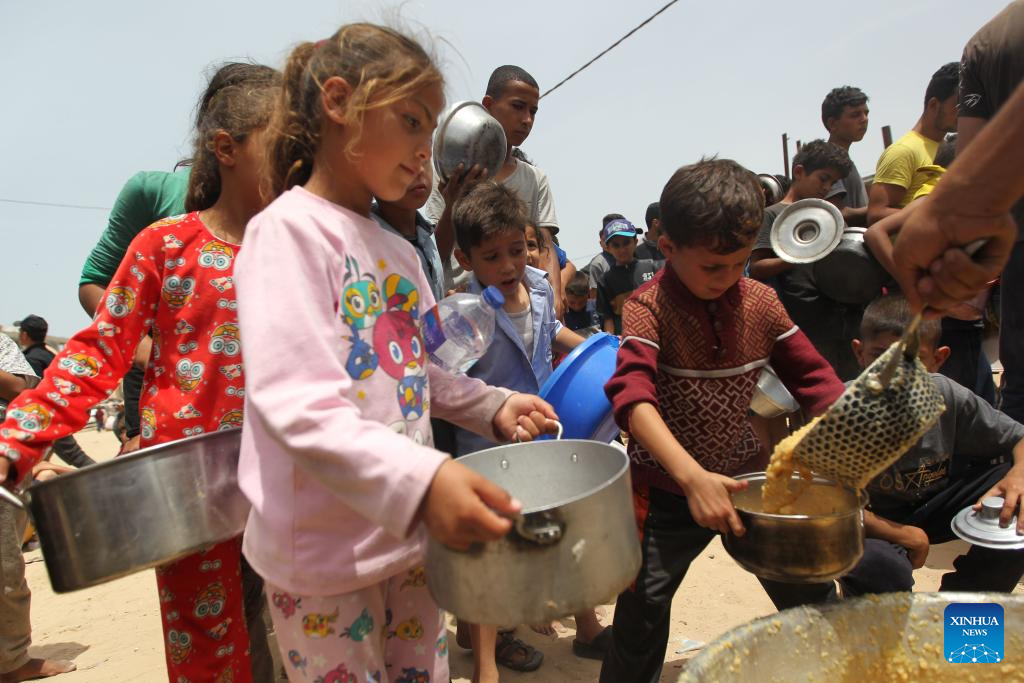The Hague-based ICJ, whose orders are legally binding but lack direct enforcement mechanisms, also instructed Israel to keep open the Rafah crossing between Egypt and Gaza, which Israel closed earlier this month…reports Asian Lite News
Israeli air strikes and artillery pounded Rafah on Saturday, despite the UN’s top court ordering an immediate halt to its military offensive in the southern Gazan city.
At the same time, renewed efforts were underway in Paris aimed at securing a ceasefire in the war sparked by Palestinian militant group Hamas’s unprecedented October 7 attack on Israel.
In a case brought by South Africa alleging the Israeli military operation amounts to “genocide”, the International Court of Justice ordered Israel to halt its Rafah offensive and demanded the immediate release of hostages still held by Palestinian militants.
The Hague-based ICJ, whose orders are legally binding but lack direct enforcement mechanisms, also instructed Israel to keep open the Rafah crossing between Egypt and Gaza, which Israel closed earlier this month.
Israel gave no indication it was preparing to change course in Rafah, insisting the court had got it wrong.
“Israel has not and will not carry out military operations in the Rafah area that create living conditions that could cause the destruction of the Palestinian civilian population, in whole or in part,” National Security Adviser Tzachi Hanegbi said in a joint statement with Israel’s foreign ministry spokesman.
Hamas, the Iran-backed Islamist group that has ruled Gaza since 2007, welcomed the ICJ ruling on Rafah but criticised its decision to exclude the rest of the Palestinian territory from the order.
In spite of the ICJ ruling, Israel carried out strikes throughout the Gaza Strip on Saturday morning as fighting raged between the Army and Hamas’s armed wing.
Palestinian witnesses reported Israeli strikes or shelling in Rafah, the central city of Deir al-Balah, Gaza City, Jabalia refugee camp and elsewhere.
“We hope that the court’s decision will put pressure on Israel to end this war of extermination because there is nothing left here,” said Umm Mohammad Al-Ashqa, a Palestinian woman from Gaza City displaced to Deir al-Balah by the war.
Mohammed Saleh said from the central Gazan city that “Israel is a state that considers itself above the law. Therefore, I do not believe that the shooting or the war will stop other than by force.”
Yahya, a 34-year-old in Gaza who did not give his second name for security reasons, said: “Perhaps these decisions… that Israel has not complied with, will make the Western world move more strongly (in favour) of our cause at popular and political levels, supporting the recognition of the state of Palestine and strengthening our rights”.
The ICJ ruling came days after Ireland, Spain and Norway said they would formally recognise a Palestinian state and the International Criminal Court prosecutor requested arrest warrants for Israeli Prime Minister Benjamin Netanyahu and top Hamas leaders on suspicion of war crimes and crimes against humanity.
In its ruling, the ICJ said Israel must “immediately halt its military offensive, and any other action in the Rafah Governorate, which may inflict on the Palestinian group in Gaza conditions of life that could bring about its physical destruction in whole or in part”.
The UN court ordered Israel to allow UN-mandated investigators “unimpeded access” to Gaza to look into the genocide allegations.
It also instructed Israel to open the Rafah crossing for the “unhindered provision at scale” of humanitarian aid and also called for the “immediate and unconditional release” of the hostages held by Hamas in Gaza.
The Gaza war broke out after Hamas’s October 7 attack resulted in the deaths of more than 1,170 people, mostly civilians, according to an AFP tally based on Israeli official figures.
Militants also took 252 hostages, 121 of whom remain in Gaza, including 37 the Army says are dead.
Israel’s retaliatory offensive has killed at least 35,857 people in Gaza, mostly women and children, according to data from the Hamas-run territory’s health ministry.
On the diplomatic front, efforts have resumed to seek the first ceasefire in Gaza since a week-long truce and hostage release in November.
CIA chief Bill Burns was expected to meet Israeli representatives in Paris in a bid to relaunch negotiations, a Western source close to the issue said.
Top US diplomat Antony Blinken also spoke with Israeli war cabinet minister Benny Gantz about new efforts to achieve a ceasefire and reopen the Rafah border crossing, Washington said.
Israel sent tanks and troops into Rafah in early May, defying global opposition. It has since ordered mass evacuations from Rafah, with the UN saying more than 800,000 people have fled.
Troops took over the Palestinian side of the Rafah border crossing with Egypt, further slowing sporadic deliveries of aid for Gaza’s 2.4 million people.
Italy on Saturday became the latest donor nation to restore funding for the UN’s agency for Palestinian refugees, having suspended it in the wake of Israeli allegations that some of its employees were involved with the October 7 attack.
Rome said it would give 35 million euros to UNRWA, joining Germany, Sweden, Canada, Japan and others in resuming donations.
The security and humanitarian situation in the territory remains alarming, with a risk of famine and most hospitals no longer functioning.
ALSO READ-Israel must obey UN court on Rafah: EU

Leave a Reply